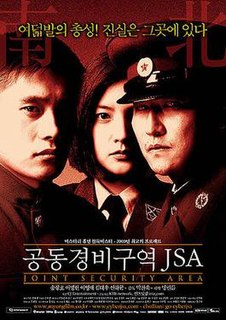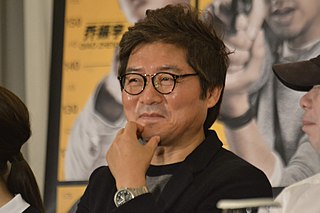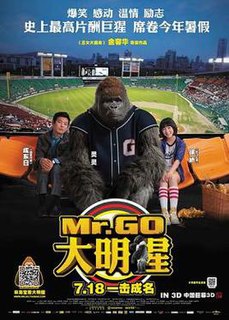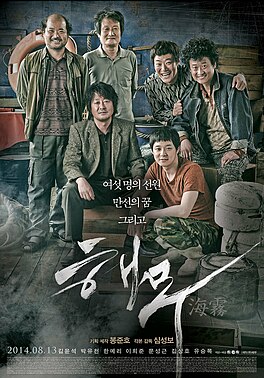This article possibly contains original research .(December 2018) |
Korean Blockbuster Movies are Korean movies which have a large impact on the film industry. Shiri is one example of a Korean blockbuster film.
This article possibly contains original research .(December 2018) |
Korean Blockbuster Movies are Korean movies which have a large impact on the film industry. Shiri is one example of a Korean blockbuster film.
The meaning of "blockbuster" is originally from the Second World War. The term arose during World War II as a large bomb, so powerful that it was capable of destroying an entire city block of buildings. After the war ended, "blockbuster" was adopted by the advertising industry including film industry in the 1950s and added it to their arsenal of superlatives alongside "astounding," "incredible" and "revolutionary." Thus, the term is used to represent big impact that a film brings to film industry. In Hollywood, blockbuster films first came out in 1950s, supported by enormous amount of money. Starting from Jaws and followed by Star Wars , blockbuster films in Hollywood became very influential. With better equipment, techniques and famous actors, films attracted many people and brought a big financial success.
In 1985, South Korea made the fifth amendment to Cinema Law. It switched the industry from an approval system to a registration system. At the time there were very few groups producing and creating films but then newer companies began to rise with the introduction to this amendment. Even with the amendment and more domestic movies being produced, Hollywood movies still dominated Korean Cinema. [1] Then as a reaction to improve domestic film’s success in 1993 a domestic quota started to become enforced which ensured that domestic films would be screened for at least 146 days a year. But domestic films continued to have a lower market share compared to foreign films. [2]
In 1999, Shiri marked a change in the Korean film industry when it defeated Titanic creating change for a rise in the appeal of domestic films. [3] A Korean film scholar even describes the box office competition as a war between South Korea and the US. After the success, there was a rise in national sentiment in choosing domestic films over foreign ones. [4] Shiri was also one of the first budget films whose budget was taken care of by Samsung. Kang Je Gyu mentioned in an interview that after Shiri, people saw filmmaking as a business and the value towards it. Chaebol companies like Samsung began to join in on the film industry around 1992 and with the success of Shiri, were willing to invest more. Chaebols then became involved in the entire processes of the film industry especially helping the distribution. It also helped that with a new leadership in government there was more interest in making films a cultural product to be shared overseas who provided incentives to create and invest in films. The distribution of domestic films became higher because Chaebols wanted more people to watch the movies that they invested in which caused them to create multiplex cinemas. [1]
Shiri featured shootouts on urban streets, exploding buildings, car chases, ticking bombs, and other narrative and visual clichés of big-budget action films from Hollywood. At the same time, it incorporated a melodramatic love story, which was very common and popular theme in Korean films and dramas. The film borrowed liberally from the model of the Hollywood blockbusters, but in addressing Korean themes it sought to be recognized and accepted as a local work. It offered big budget spectacle, special effects, star power, and a politically resonant theme. These factors turned the film into something more special than imported Hollywood blockbuster films, and the film became one of the most popular films in Korea and was successful financially. Shiri’s most lasting effect may have been to impart to the industry a sense of expanding possibilities and self-confidence because it opened a door for Korean blockbuster films.
After the release of Shiri, it allowed for more blockbusters to come out and continued because of interest and a future of possible investments. Blockbuster production halted after a few losses but then saw another rise in 2004 with the release of Taegukgi and Silmido. [5] With the confidence that Korean films can compete against Hollywood films, other blockbuster films started to come out. The second blockbuster film that had a big impact and success was JSA . JSA featured a well-known cast, a large budget, and a politically timely theme centered on North-South relations. If Shiri more obviously utilized Hollywood conventions to stage and explore Korea-specific themes, JSA displays a wider range of influences in presenting its complex story. One of important milestones that JSA achieved was that it used the unique theme, which could not be found in Hollywood films. JSA differentiated itself from Hollywood blockbuster films and established its own genre. It was with Shiri and JSA, both of which staked early claims to blockbuster status in their pre-releasing marketing that the concept of the Korean blockbuster began to take shape.
During the Korean blockbuster era, the members of the 386 generation emerged as leading directors of blockbuster movies. The directors of 386 Generation specifically filled this role as they had film education backgrounds and even some were educated abroad. Because of changing governments they also did not have to worry about censorship. [6] They also helped influence the common themes that were present in blockbuster movies. Due to them growing up in a more political tumultuous time in Korea, they were allowed to explore themes that could have not happened before with censorship. Another aspect is this generation also tried to incorporate their own culture into their movies. They have been known to use their culture and history for their own commercial gain. [5] Kang Je Gyu and Park Chan Wook who directed some important Korean blockbuster movies like Shiri and Joint Security Area are part of this generation. Other notable names are Bong Joon Ho, Kim Sung Su and Kwak Kyu Taek who were also directors of early blockbuster films. [5]
In the time of Korean blockbusters, anti-Americanism and national division are popular themes used by the directors. These themes differ from other cinemas and appeal to the history and current issues of the Korean people. [5]
Joint Security Area, Shiri and Taegukgi, Welcome to Dongmakgol are notable blockbuster films that touch upon the division of Korea. They all deal with the North Korea and South Korea's relationship with each other. JSA, Shiri, Taegukgi and Welcome to Dongmakgol have a common theme of brotherhood. Characters can be brothers, co-workers, soldiers but all develop or already share a strong relationship. With the rise of blockbuster movies, the directors choose to view their post-war life as a tragedy and choose to humanize the North Koreans. Most characters as well do not have a happy ending. The broken relationships between bonds of the characters is supposedly an allegory to the division between two countries that once were one. [6]
A prime example of this theme is The Host by director Bong Joon Ho. His blockbuster movie was inspired by a real life case where a mortician employed by the US Air Force ordered to dump toxic embalming fluid down the drain. This drain led to the Han River which caused a controversy. [7] Cho Jin Hee explains that in the film The Host, there are inferences and allusions to the US presence in South Korea. The film even begins with a scene similar to the actual case. [5] However, Nikki Lee points out that although it uses a real-life incident, the Host is not overtly political or nationalistic and does not take a particular stance. [4] Bong Joon Ho himself however even admits that the anti-American element was not a focus of the film but he feels that the South Korean audiences and few critics enjoyed it. [8]

Shiri is a 1999 South Korean action film, written and directed by Kang Je-gyu.

The contemporary culture of South Korea developed from the traditional culture of Korea which was prevalent in the early Korean nomadic tribes. By maintaining thousands of years of ancient Korean culture, with influence from ancient Chinese culture, South Korea split on its own path of cultural development away from North Korean culture since the division of Korea in 1948. The industrialization, urbanization and westernization of South Korea, especially Seoul, have brought many changes to the way Korean people live. Changing economics and lifestyles have led to urbanization—a concentration of population in major cities, with multi-generational households separating into nuclear family living arrangements. Today, many cultural elements from South Korea, especially popular culture, have spread across the globe and have become some of the most prominent cultural forces in the world.

Joint Security Area is a 2000 South Korean mystery thriller film starring Lee Young-ae, Lee Byung-hun and Song Kang-ho. It was directed by Park Chan-wook and is based on the novel DMZ by Park Sang-yeon. The film, which was shot on location in South Korea, concerns an investigation into the circumstances surrounding a fatal shooting incident within the DMZ, the heavily fortified border that separates North and South Korea.

Memories of Murder is a 2003 South Korean crime thriller film co-written and directed by Bong Joon-ho. It is loosely based on the true story of Korea's first confirmed serial murders, which took place between 1986 and 1991 in Hwaseong, Gyeonggi Province. Song Kang-ho and Kim Sang-kyung star as Detective Park and Detective Seo, respectively, two of the detectives trying to solve the crimes.

Song Kang-ho is a South Korean actor. Song made his film debut in The Day a Pig Fell into the Well (1996), and came to national prominence with a series of critically acclaimed performances, including No. 3 (1997), Joint Security Area (2000), Sympathy for Mr. Vengeance (2002), Memories of Murder (2003), The Host (2006), and A Taxi Driver (2017). Song rose to international prominence for his performances in Snowpiercer (2013) and Parasite (2019), the latter of which won the Palme d'Or at the Cannes Film Festival and the Academy Award for Best Picture. He was awarded Best Actor at the 75th Cannes Film Festival for his performance in Broker.

Kang Je-gyu is a South Korean film director.

Seopyeonje is a 1993 South Korean musical drama film directed by Im Kwon-taek, based on the novel of the same name by Yi Chong-jun. It tells the story of a family of traditional Korean pansori singers trying to make a living in the modern world. It is the first South Korean film to draw over one million audiences and has significant influence in reviving popular interest in traditional Korean culture and pansori.

Bong Joon-ho is a South Korean film director, producer and screenwriter. The recipient of three Academy Awards, his filmography is characterised by emphasis on social themes, genre-mixing, black humor, and sudden tone shifts.

The cinema of South Korea refers to the film industry of South Korea from 1945 to present. South Korean films have been heavily influenced by such events and forces as the Japanese occupation of Korea, the Korean War, government censorship, the business sector, globalization, and the democratization of South Korea.

The Host is a 2006 South Korean monster film directed by Bong Joon-ho and starring Song Kang-ho, Byun Hee-bong, Park Hae-il, Bae Doona and Go Ah-sung. The film concerns a monster kidnapping a man's daughter, and his attempts to rescue her. According to the director, his inspiration came from a local article about a deformed fish with an S-shaped spine caught in the Han River.
Korean horror films have been around since the early years of Korean cinema, however, it was not until the late 1990s that the genre began to experience a renewal. Many of the Korean horror films tend to focus on the suffering and the anguish of characters rather than focus on the explicit "blood and guts" aspect of horror. Korean horror features many of the same motifs, themes, and imagery as Japanese horror.

Showbox Co., Ltd. is one of the largest film distribution companies in South Korea, founded in 1999. Showbox is the film investment, production and distribution branch of Mediaplex, Inc., entertainment arm of Orion Group. Its main competitors for domestic box office are CJ Entertainment, Lotte Entertainment, and Next Entertainment World (NEW). Despite having very short history in the industry, they managed to have top 6 of 10 blockbusters in Korean box office history, number 1 being 2012's The Thieves.

Mother is a 2009 South Korean thriller film directed by Bong Joon-ho, starring Kim Hye-ja and Won Bin. The plot follows a mother who, after her intellectually disabled son is accused of the murder of a young girl, attempts to find the true killer in order to get her son freed.

Snowpiercer is a 2013 post-apocalyptic science fiction action film based on the French climate fiction graphic novel Le Transperceneige by Jacques Lob, Benjamin Legrand and Jean-Marc Rochette. The film was directed by Bong Joon-ho and written by Bong and Kelly Masterson. A South Korean-Czech co-production, the film marks Bong's English-language debut; almost 85% of the film's dialogue is in English.

Mr. Go is a 2013 South Korean sport-comedy film written and directed by Kim Yong-hwa based on Huh Young-man's 1984 comic The 7th Team (Korean: 제7구단). About a gorilla who becomes a baseball superstar and his 15-year-old female manager, it stars Xu Jiao and Sung Dong-il. Mr. Go was the first South Korean film to be fully shot in 3D. A co-production between South Korea and China, it was released simultaneously in both countries on July 17 and 18, respectively.

Sea Fog is a 2014 South Korean film directed by Shim Sung-bo. The film is adapted from the 2007 stage play Haemoo, which in turn was based on the true story of 25 Korean-Chinese illegal immigrants who suffocated to death in the storage tank of the fishing vessel Taechangho; their bodies were dumped by the ship's crew into the sea southwest of Yeosu on October 7, 2001.

Chung Ji-young is a South Korean film director and screenwriter. Among his most well-known films are North Korean Partisan in South Korea (1990), White Badge (1992), Life and Death of the Hollywood Kid (1994), Unbowed (2012) and National Security (2012).

Parasite is a 2019 South Korean black comedy thriller film directed by Bong Joon-ho, who co-wrote the screenplay with Han Jin-won and co-produced the film. The film, starring Song Kang-ho, Lee Sun-kyun, Cho Yeo-jeong, Choi Woo-shik, Park So-dam, Jang Hye-jin, Park Myung-hoon, and Lee Jung-eun, follows a poor family who scheme to become employed by a wealthy family and infiltrate their household by posing as unrelated, highly qualified individuals.

Bong Joon-ho is a South Korean film director, producer, and screenwriter who began his career in 1994 after creating the short films Baeksaekin, Memories in My Frame, and Incoherence. In 1997, Bong wrote the feature film Motel Cactus, for which he also served as an assistant director. Two years later, he wrote Phantom: The Submarine, and later made his feature-length directorial debut with Barking Dogs Never Bite (2000). In the following years, Bong wrote and directed Memories of Murder (2003), The Host (2006), Mother (2009), and Snowpiercer (2013), films which received "universal acclaim" from critics.

Sharon Choi is a South Korean interpreter and film director. She received widespread recognition and praise as Bong Joon-ho's Korean–English interpreter during the 2019–2020 film awards season.